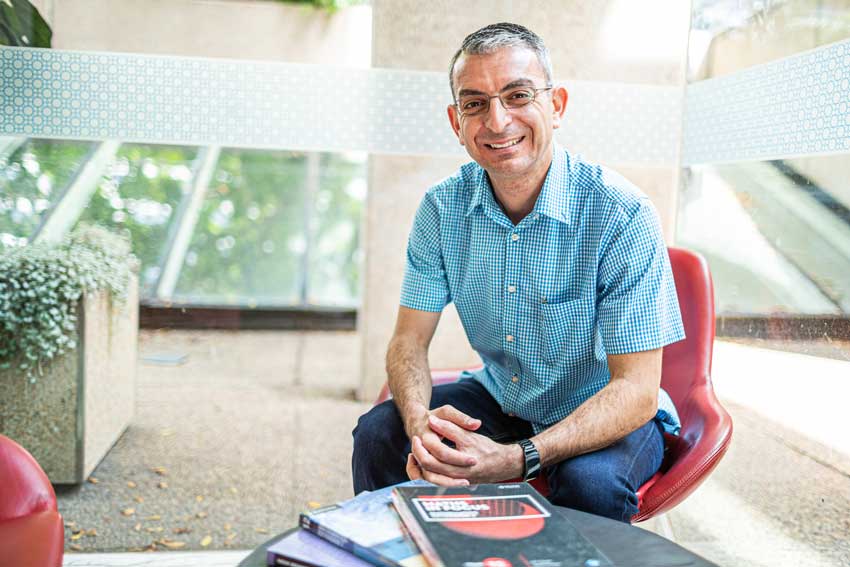
With the recent announcement by the NSW government that mathematics will become a compulsory subject for Years 11 and 12, teachers and parents everywhere are wondering how to keep students not only participating but engaged in the subject.
Added to that is the shortage of dedicated mathematics teachers, with 76 per cent of students taught by a teacher from a different field at least once during their first four years of high school according to the Australian Mathematical Sciences Institute.
Coming to the rescue are teachers like Michael Zaouk, armed not only with deep knowledge of mathematics but the skills and talent to ignite a love of the subject in their students.
Michael is upskilling by completing a Master of Mathematics Education degree at the University of Notre Dame, Sydney, one of a new suite of postgraduate offerings designed to ease the shortage of maths teachers.
Currently teaching maths at St Patrick’s Marist College, Dundas, next year he will join the staff at St Ursula’s College in Kingsgrove where he looks forward to providing a challenging yet supportive environment that promotes the inner mathematician within.
The dean of the school of arts and sciences Professor Cate Thill said that ideally students would do the subject “not simply because the subject is compulsory” but “because they are inspired by its beauty and motivated by its real-world application”.
We spoke to Michael about his passion for the subject and got his best tips for parents (and teachers) who have a child who dislikes maths.
When did you first realise you liked maths?
I realised I LOVED mathematics when I started teaching it. The more I engage in it, the more I love it and in particular the associated challenges with finding better ways to help break down and explain concepts to my students.
I quickly found that the more I know, the more I wanted to know!
What do you love about it (or about teaching maths)?
Mathematics helps me to understand my universe, and at the same time understand my human limitations.
To me it is not just a subject but a discipline – a way of thinking. It is the language of logic and reasoning that is rich in history. Modern mathematics is a culmination of thousands of years of development and contributions by people from all cultures, all over the world.
It’s also part of everyday life, whether it be to do with making sound financial decisions, understanding statistics in the media, household budgeting, income tax and GST, owning a car and more.
You say that anyone can be good at maths. Is that really true?
Mathematics does not discriminate between people. Anyone can be good at maths if they commit themselves.
I teach my students to see mathematics as beautiful, akin to numerical poetry. I especially love seeing the expression on my students’ faces, watching those ‘ah ha!’ moments when a concept gels and when they begin to realise they are much better at maths than they thought they were when they start asking questions that go well beyond the concepts taught.
Why is maths important?
Simple. Maths is to the mind as physical exercise is to the body. Mathematics is one way of increasing mental fitness that can be applied to anything else that requires a similar thought process, much the same way as increasing physical fitness helps make everyday tasks easier.
Think of a student who plays sport. Unless they aspire to turn professional and make a living out of the sport, they play because it is interesting, enhances social interaction and increases physical health and wellbeing.
You say that maths helps you grow closer to God. How is that?
There is something divine about mathematics, that when talking about the concept of infinity for example, I think of God’s endless love for us and His unbounded mercy which cannot be measured or counted.
I genuinely believe we are all mathematicians at heart and being able to think mathematically sets us apart from the rest of God’s creations.
Michael’s 5 tips for parents whose kids dislike maths
- Take an interest in what your child is learning, even if that means learning some of the concepts yourself. Sit down together and try and work out the concepts collaboratively. Parents are the child’s first and most important teachers and hence it is critical that a positive example is always modelled to your child, even if you feel the child is not paying attention.
- Remind your child that it is ok to make mistakes – rather a “mistake” is a necessary learning experience that a child can learn from to improve their craft. I always say to my students “Make a million mistakes but learn one new thing, it’s better than making no mistakes but learning nothing at all!”.
- If your child is currently struggling, go back and attempt simpler questions or even related questions from a previous year or stage to help (re)build their confidence.
- Tame the distractions. In my view, there is nothing more detrimental to learning mathematics effectively than having distractions such as mobile phones or social media messaging apps frequently interrupting your child’s train of thought. If your child plays a sport, they wouldn’t have their phone with them to distract them while engaging in the sport if they want to have a chance of winning.
- Be gentle and patient in your encouragement of your child. The best learning outcomes are achieved when a child decides they WANT to learn maths rather than feeling they are being forced to. In the short term, punitive measures may work such as removing a privilege but is generally an ineffective long term strategy. Set short study goals (e.g. 20 minutes per evening) to begin with and as your child gets accustomed to the routine, you can increase the time spent per study
